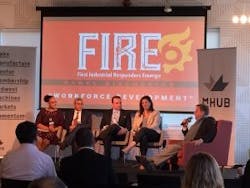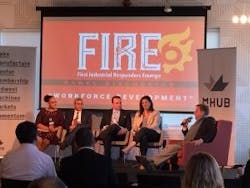Changing attitudes, overcoming workforce challenges
As indicated by responses in the 2018 Smart Industry State of Initiative Report, the technologies at the core of digital transformation might be outpacing workforce’s capability to employ them. Workforce development is top-of-mind among manufacturers adopting the tools they need to stay competitive in Industry 4.0.
The workforce-development panel at mHUB Chicago
“When employees are retiring and it’s increasingly difficult to find skills you either freak out or do something about it,” said Steve Kase, CEO of ASK Power, who moderated last week’s panel on the future of manufacturing-workforce development at mHUB Chicago. The panel included Karin M. Norington-Reaves, CEO of the Chicago Cook Workforce Partnership, Juan Salgado, chancellor of the City Colleges of Chicago, Aaron Wiegel, president of Wiegel Tool Works, and Jenny Kopach, executive director of Science Olympiad.
At the start of the evening, Norington-Reaves bristled at the notion of a skills gap. “I don’t like that term,” she said. “People have skills but what employers say they are looking for don’t always align. There are people out there with phenomenal skills and employers with great jobs. But they often miss each other. Both sides need to know that the other exists.”
Alongside the skills gap—or whatever you want to call it—the aging workforce was a recurring theme this evening. “We are getting older; that is prevalent in industry,” said Wiegel, who partnered with his enterprise's HR department a decade ago to address the problem. They developed a robust training program that culminates in certification from the US Department of Labor. The result has been a steady influx of skilled personnel for Wiegel Tool Works. “If we plan to survive we have to maintain that pipeline,” he added.
Complicating both issues, at least in Chicagoland, Salgado noted that technical training in public high schools is waning. He cited how local Daley College is unveiling an advanced manufacturing-training facility to fill that gap for both college students and the younger set. “It will enable us to bring students in to understand the linkages between man and food and products,” he said. “Highlighting all the ways that manufacturing improves our lives and all the workforces and skills and learnings that are a part of that.”
Building a bedrock of education was cited as a critical component to overcoming most of the challenges facing manufacturing in the digital age. And Kopach chimed in with an optimistic perspective. “It is easier to motivate students today,” she surmised. “Their perception of manufacturing has changed. Some of those myths about old-school manufacturing have been discarded—the salaries, the work environments. These are true pathways to good lifestyles.”

